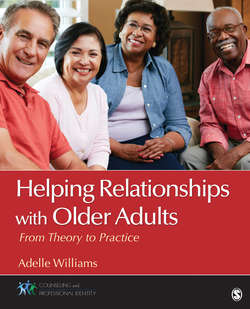Читать книгу Helping Relationships With Older Adults - Adelle M. Williams - Страница 39
На сайте Литреса книга снята с продажи.
Emotions
ОглавлениеEmotions change with age; however, aging adults can improve in the area of emotional regulation (Kensinger, 2009). Healing emotions (serenity, gratitude, and reverence) bolster the immune system. They have been long understood in alternative medicine and are slowly coming to be accepted by the mainstream medical community as well. Since decreased immune function is common in later life, whatever can be done to strengthen it is good. Positive emotions boost two kinds of immune system cells: T cells and natural killer cells, large white blood cells that attack cancer cells and infected cells (Cohen, 1998). Immune function varies greatly, but people over 75 or 80 usually need longer to recover from a cold or from wounds, and their infections tend to be more serious than those of younger people.
Older adults can develop healing emotions. Practitioners can teach stress reduction techniques to encourage relaxation. They can also encourage older persons to develop a spiritual connection (if one does not already exist), and they can empower elders to be assertive and take control of their health. Practitioners can also encourage older adults to embrace the aging process, focus on their strengths and abilities, and give of themselves (talents, knowledge, experience) to others. A common way serenity is cultivated is gardening. Nurturing new growth is calming, and gardeners seem to thrive in old age. The ability to feel and express gratitude is an important part of healthy aging. In the lives of most people, there are at least a few things to be grateful for. Sometimes this is just a matter of mindfulness, for example, promoting thinking like “I’m grateful that it is a clear night and I can see the stars.” Gratitude does not depend on external circumstances, and it helps to counter the message from industrial societies that we need more of everything (Macy, 2007). Reverence is more abstract than gratitude or serenity. The hard breathing that accompanies strenuous exertion or exercise can induce feelings of reverence. This emotion acknowledges the life force greater than our individual spark. It may make us feel small or exalted. A group experience may evoke it, or it may be solitary. People who see the northern lights report feelings of reverence. This emotion may come from a flash of understanding that all things are interconnected. Looking over one’s life may inspire reverence for the sheer doggedness of humans who live to be old (Cruikshank, 2009).
Case Illustration 1.1 shows the natural physical changes that may accompany aging and the manner in which older persons can adapt to their environments with an adequate support system and stay actively engaged. The changes demonstrated include mobility issues, development of osteoporosis, decreased activities of daily living, loss of vision and hearing acuity, and digestive challenges.
Case Illustration 1.1
A 98-year-old elderly woman lives in her three-bedroom home with her adult daughter who is 75 years old. She drove until her early 80s, at which time she had an accident and was hospitalized. She ambulates with the assistance of a walker and an occasional arm to hold onto and is fearful of falling because of her recent diagnosis of osteoporosis. She attends church services regularly, watches television daily, and enjoys conversing with family and friends in her home and via telephone. Her daughter prepares her meals, washes her laundry, and manages her finances. She has one outside provider, a registered nurse, who comes to her home on a monthly basis and conducts a physical assessment. Overall, she is in good health and is thankful for every day she is alive. She doesn’t know if she will see age 99; however, she leaves it up to the “man upstairs.”
This individual is living in her home, has the assistance of a loving daughter, and is visited regularly by friends and neighbors. She is able to attend church (which is very important to her) and engage in a few activities that bring her joy. Despite her limited mobility and slowness in ambulating, she is overall very satisfied with life. She is able to live at home because she has an excellent support system. Though she has difficulty with her vision, she wears bifocal glasses to help her see; her hearing is impaired, but she wears a hearing aid, which enhances her ability to hear. Her biggest complaint is that of constipation, which is not uncommon due to the slowing of the digestive system and more sedentary lifestyle, along with decreased daily fluid intake.
